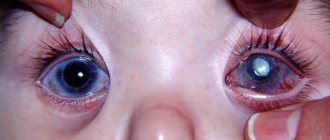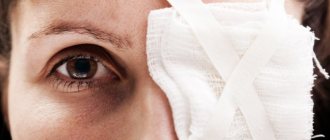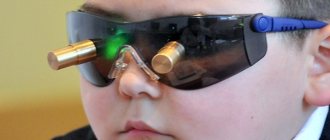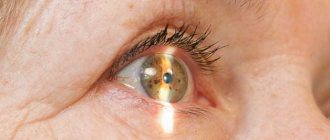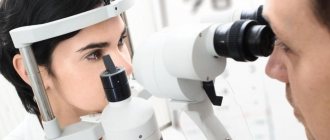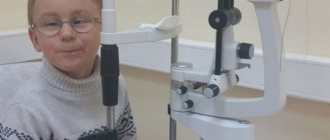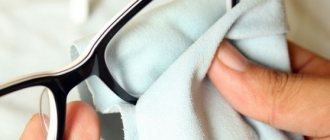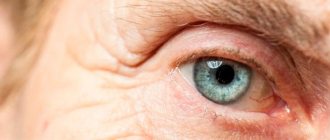Most likely, you will not need glasses after cataract surgery. During the examination, the doctor determines the necessary curvature of the intraocular lens in such a way as to provide the patient with good vision under average conditions. The ideal option is to install a multifocal lens, which will make it possible to clearly see objects located at different distances. We know that the human lens can change its curvature and this property is imitated by similar products. Of course, muscles are not involved in the accommodation process, it’s just that a multifocal IOL has several focusing points - each designed for a specific range of distances. About 90% of patients who have such a lens implanted do not use glasses.
However, in some cases, wearing glasses or contacts after cataract surgery is still necessary.
Sunglasses
Sometimes the doctor prescribes sunglasses (dark) glasses after cataract surgery. They need to be worn during the rehabilitation period for two reasons:
- 1) To protect against exposure to ultraviolet radiation on the eye. Although many artificial lenses have a special coating that does not allow these rays to pass through, it is still better to be safe than sorry
- 2) Dark glasses will also help prevent dust, dirt and other foreign objects from getting into your eyes. At the same time, they will protect you from the wind. After cataract removal, you must avoid any damage or actions that could injure the artificial lens.
Dark glasses after vision correction: why, why and for how long?
At first glance, it would seem that there is nothing to talk about here. Dark glasses after laser vision correction are a standard recommendation.
But why are they needed? And suddenly you lost the piece of paper with recommendations and don’t know how long after the vision correction surgery you should wear dark glasses?
We decided to collect answers to all questions about sunglasses in one material.
Why wear sunglasses: two main reasons
Yes, even in the rain. In the first days after surgery, glasses are worn every time you go outside.
The first reason is to protect your eyes in the first days after correction. In the first three to four days after vision correction, dark glasses are needed to protect the eyes from external factors. Dust, wind, flies, sand - no foreign bodies should enter your sensitive eye after surgery. After three to four days it heals and you no longer need to wear glasses.
This is why dark glasses should be worn even in cloudy weather.
The second reason is protection from ultraviolet radiation in the first three to four weeks. Wearing dark glasses after vision correction is also necessary so that the eyes are not irritated by the sun's rays.
How harmful is ultraviolet radiation in the first weeks after surgery? Firstly, the new nerve endings that the laser vaporized have not yet formed in the eye. Healing occurs within the first month.
In addition, ultraviolet radiation can provoke the growth of the very tissue that we evaporated with a laser during the operation - that is, it can worsen vision. Therefore, doctors’ recommendation for the first month is to wear glasses with a good UV filter in sunny weather. When it's cloudy outside, you can walk without glasses (if the first three days have already passed).
By the way, the advice about wearing dark glasses in sunny weather is also true for those who have not had vision correction. Everyone needs them.
What glasses do ophthalmologists recommend wearing after correction?
Above all, a high-quality UV filter. It's okay if your glasses model went out of style last season.
The brand and model are not as important as a quality UV filter. This is the only recommendation that matters.
What can happen if you don't wear sunglasses after correction?
Don't neglect dark glasses. Your eyes will tell you: “Thank you!”
The consequences may vary depending on the period during which you neglected your glasses.
Early period after surgery - external irritants can lead to inflammation and infection. Any speck of dust can interfere with the healing of the eye. Even just the wind can cause your eyes to begin to water profusely.
Late period after surgery - ultraviolet light can stimulate the growth of tissue that was evaporated by the laser, or damage the retina.
That is why it is better to listen to doctors and wear dark glasses as long as necessary so that after the eyes have completely healed, you can fully enjoy your new vision!
Alexander Padar Founder of the Omicron clinic
Lenses after cataract surgery
Modern surgical methods restore vision in case of cataracts in 90% of cases. After some time, the patient fully recovers and leads a normal life. Therefore, there are no restrictions on the choice of optical vision correction - you can wear either glasses or lenses - whichever is more convenient for you.
Remember! Only a doctor can determine what glasses to wear after cataract surgery. To do this, in our clinic, before surgery, the patient is examined using modern ophthalmological equipment, including an eye tomograph. After treatment, the doctor will definitely examine you again and, based on the results of the operation, will prescribe you glasses or lenses with the required diopters. Independent choice can cause vision deterioration!
Recommendations after laser vision correction
- After excimer laser correction, you will have to spend about an hour or two in the clinic . This is necessary so that after the laser correction procedure, the doctor does a control examination of your eyes to make sure that the upper layers of the cornea fit correctly.
- After excimer laser correction, you can return home on the same day. Vision correction is carried out in a “one-day” mode, without hospitalization. But you need to undergo mandatory checks after 1,3,7,14 days, and after that - after 1,3 months.
- If necessary, during the postoperative examination, the doctor will give you special drops that protect against infection, which you will need to instill for several days.
- Instill drops (2 drops 4 times a day) until the doctor cancels them. It is necessary to instill drops into the lower fornix of the conjunctiva - when looking up, moving the lower eyelid down. It is effective to instill drops while lying down, fixing both eyelids.
- Please note that drops, ointments, and eye gels can only be used as prescribed by a doctor!
- IMPORTANT! After the correction, lacrimation is possible, do not rub your eyes under any circumstances, blot the tear on your cheek with a clean handkerchief or sterile napkin. Avoid touching your eyes in any way during the first 24 hours after correction.
- In the first hours after surgery and during the day (2-3 times), if necessary, you can take sedatives and painkillers (analgin, baralgin, ketorol, etc.).
- On the first day after laser vision correction, try to sleep on your back.
- Avoid getting soap or shampoo in your eyes for the next 2-3 days.
- During the rehabilitation period (about a week), the following are CONTRAINDICATED: getting dirty water into the eyes, visiting a pool, bathhouse, sauna, swimming in ponds;
- physical activity associated with increased injury and heavy lifting (dancing, skiing, skating, contact and extreme sports and other traumatic activities);
- women are not recommended to use decorative cosmetics, hairspray, and aerosols;
- Sunbathing is not recommended; doctors also advise wearing sunglasses in sunny weather;
- During the recovery period you should refrain from drinking alcohol.
Be sure to follow all the doctor's recommendations and instructions!
After laser correction of high degrees of myopia, farsightedness, and astigmatism, a person needs some time to finally adapt to the new vision. The brain must adapt to visual information that is unusual for it. In order to “help” him, at the Excimer clinic, patients are given the opportunity to adapt using a special device “Reamed”, developed by specialists from the Brain Research Institute.
The operation of the device is based on the method of video-computer auto-training. This approach optimizes the functioning of neurons in the visual cortex, and vision is significantly improved.
Remember!
The result of laser correction does not change over time - this is a proven fact. Vision correction underwent multi-stage clinical trials before it was used by ophthalmologists in medical centers and clinics around the world. Since the late 80s, more than 15 million corrections have been made and so far there have been no cases of vision deterioration after excimer laser correction using the LASIK technique.
Patient Reminder
How to prepare for surgery
If you are about to be hospitalized in the eye department of the MNTK "Eye Microsurgery" named after. acad. S.N. Fedorov, the following tests and consultations are necessary:
List of necessary tests for hospitalization
Remember that the shelf life of most tests is 1 month.
How to behave during surgery
During the operation, you must try to completely relax, do not tense or push, follow all the surgeon’s instructions, do not make sudden movements, do not turn your head and do not talk unless absolutely necessary. If something bothers you, you need to calmly and briefly tell the surgeon about it.
How to behave after surgery
After surgery, you will need to take anti-inflammatory drops, so you need to purchase them in advance, following your doctor's recommendations.
After 9–14 days, if the instructions are followed correctly, the redness of the operated eye will disappear. You will be able to calmly look at the light, lacrimation and the sensation of a foreign body in the eye will not bother you.
In the future, we recommend that you regularly, 2-3 times a year, visit an ophthalmologist to check your visual acuity and monitor intraocular pressure.
Until the incision is completely healed, usually within 3 weeks, you must especially carefully observe the rules of hygiene so as not to cause an infectious process. You should not rub the operated eye with your hands, sleep on the side of the operated eye, and wash your hands thoroughly before putting eye drops. We do not recommend washing with running water. It is advisable to wipe the skin of the eyelids with a cotton swab moistened with boiled water at room temperature.
Preventing vision loss
With timely detection and proper treatment, thanks to modern methods, most patients with glaucoma manage to maintain their vision. Reducing intraocular pressure and preventing attacks of the disease make it possible not to lose this important function of the body and avoid blindness. After all, with the help of our eyes we receive 90% of the information about the world around us.
Only a specialist can help you recognize the disease.
If you are over 40 years old, you should see an ophthalmologist annually.
Tips for a speedy recovery
To ensure that the postoperative period passes without complications and in the shortest possible time, follow the advice of our specialists:
- strictly follow the regimen prescribed to you;
- do not rub the operated eye with your hands or press on it;
- When you shower or bathe, be careful not to get water or soap suds into your eyes. To do this, you can cover it with a sterile gauze pad and adhesive tape. After a shower, it is advisable to apply disinfectant eye drops;
- wear sunglasses when outdoors;
- try not to expose the operated eye to sudden temperature changes: for the first 3 months after surgery, refrain from visiting the bathhouse, swimming pool, steam room; do not lift heavy objects;
- for 3 months after surgery, refrain from performing physical work, especially those related to tilting the head;
- to pick something up from the floor, do not bend down, but squat;
- try not to make sudden movements with your head, imagine that you have a glass of water on your head, and you must move so smoothly so as not to splash the water;
- Eye cosmetics can be used no earlier than 2 months after surgery;
- You should completely avoid sports for the first 3 months after surgery. Over time, you can start doing morning exercises, swimming, jogging and other physical exercises that are not associated with sudden shaking and body tension (short distance running, diving, horse riding, weight lifting, boxing, team sports are completely excluded );
- Do not drive until your eye is completely healed.
